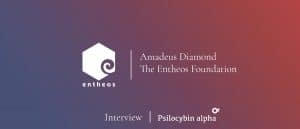We spoke to JR Rahn, Co-Founder, Director & Co-CEO of MindMed. We asked JR about his Company’s clinical trials, how COVID-19 has affected their operations, and their plans for the future.
It’s a stressful time for many of us, given the current COVID-19 pandemic. How has (or will) this global situation affected MindMed’s operations?
MindMed was always operating with offices and laboratories around the world. Our team was used to Zoom calls and so our operations were unaffected.
What we have done is double down on our mission to fight mental illness as these medicines will be needed to help recover from the psychological effects of COVID-19. Now, more than ever, people will need help with diseases such as anxiety, depression, addiction, and PTSD. For example, in animal models we know isolation can lead to a 19x increase in addictive behavior. This creates a need for innovative mental health solutions to combat this type of fallout.
Some companies in the space are creating (or are planning to create) lifestyle brands for their product offerings. Can you give us an idea of what your brand positioning and marketing may look like?
We are a drug development company. MindMed focuses on R&D to treat mental illness. This is done through rigorous clinical trials in compliance with the FDA.
You recently announced that Phase 2 of MindMed’s LSD for adult ADHD clinical trial will be carried out at Maastricht University. Could you tell us a bit more about the trial, and the timeline?
We are working with Dr. Kim Kuypers and Maastricht University and are currently in the regulatory ethics submission process in the Netherlands with plans to begin the Phase 2a clinical trial by the end of the year. This working relationship has the potential to advance treatment of ADHD, a problem that impacts 213 million people worldwide.
You recently announced that MindMed has filed a US patent application for an LSD trip neutralizer technology, to better control dosing in a clinical setting. How do the potential applications of LSD as a microdose prescription and LSD as an in-clinic treatment differ?
MindMed’s mission is to solve mental health problems. We believe in the therapeutic benefit that LSD may be able to provide in synergy with cognitive behavioral therapy. This end goal arises from a variety of experiences. Some might label these experiences as positive or negative. It is not our intention to label a patient’s experience. Our goal is to provide solutions. Within those solutions, we believe patients deserve control. Our neutralizer technology was designed to do just that; provide control. If I sit in a dentist chair, and the dentist starts pulling on the wrong tooth, I have the ability to stop him. We want to provide the same control to our patients. It is not our intention to throttle the therapeutic benefit of LSD.
Scott Freeman, MindMed’s chief medical officer, suggested that this trip neutralizer could also be time-released. Is it possible that this could allow larger doses of LSD to be taken outside of clinics, i.e. in the home?
Right now, we are focused on clinical settings and doses of LSD. It is important that we remain vigilant to our mission to use these substances on a medical basis.
Do you envisage the time-to-market of your take-home (prescription) and in-clinic offerings differing significantly?
All of our solutions are based on the timeline of our clinical trials. Our solutions are not dependent on external variables.
One of the high barriers to entry in the psychedelics space (versus the cannabis space, for example) is the presence of IP and Patents, with many companies – including yours – seeking to build significant patent libraries. With this in mind, can you clarify the patent status of 18-MC?
This may be a misinterpretation of our mission. We are not interested in building barriers to entry by assembling a patent library. We are interested in solving mental health problems such as addiction, depression, anxiety, ADHD, and PTSD. We welcome companies of all sizes to accomplish this mission as a community. The whole is greater than the sum of its parts.
If 18-MC is not eligible for patent protection, how and why will MindMed’s offering stand out against those of other companies?
Again, our concern is not around standing out through our patents. We consider ourselves successful in the event that we are able to treat debilitating mental health issues such as depression which is predicted to cost the global economy $16 trillion by 2030.
What would you say to those looking to invest in this emerging space?
It’s important to understand the business profiles of the companies emerging in the space. MindMed is focused on manifesting its work through FDA approved drug trials. We are not interested in hype, we are interested in science backed by empirical evidence.
What are you, and the MindMed team, most excited about in 2020?
We all got into this to help people and with my background in tech, I’m driven to innovate. Progress and destigmatizing a misunderstood medicine excites me. We will continue relentlessly driving toward our end goal of providing solutions to mental health diseases through FDA compliant clinical trials.
Join our Newsletter
Get our interviews delivered to your inbox by signing up to our newsletter.






